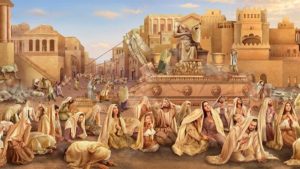Who Are We Trying to Please?
There were several times in Paul’s letters that he had to defend his apostleship and authenticity. On one such occasion he wrote, “For am I now seeking the favor of men, or of God? Or am I striving to please men? If I were still trying to please men, I would not be a bondservant of Christ” (Gal. 1:10). This raises a good question for us. Who are we trying to please? It is easy to see how this motivation could change the perspective we have on so many things.
If we are living to please God, then our lives and thought processes would be oriented in that direction. There would be several things that I would be putting first, no matter the circumstances. I would be seeking what was best for the advancement and promotion of the kingdom (Matt. 6:33). I would be seeking to establish God’s righteousness and not my own (Matt. 6:33; Rom. 10:1-3). I would “keep seeking the things above” and “set [my] mind” on those things (Col. 3:1-2). I would be thinking and pondering on those things that have the highest moral value (Phil. 4:8). I would make every effort to be pleasing to God. “Therefore we also have as our ambition, whether at home or absent, to be pleasing to Him” (2 Cor. 5:9).
By orienting my life in this way, God has made assurances to us. He has assured us that He has our best interest at heart, not wanting any to perish (2 Pet. 3:9). He has proven Himself over and over again to be faithful in His promises, even when mankind hasn’t been (Heb. 10:23). He has shown us loving kindness that we do not deserve (Eph. 2:7). He has forgiven us when we didn’t deserve it (1 John 1:9). He has given us grace through His Son (2 Tim. 1:9). He even has promised us a reward after already doing so much for us. “Blessed be the God and Father of our Lord Jesus Christ, who according to His great mercy has caused us to be born again to a living hope through the resurrection of Jesus Christ from the dead, to obtain an inheritance which is imperishable and undefiled and will not fade away, reserved in heaven for you, who are protected by the power of God through faith for a salvation ready to be revealed in the last time” (1 Pet. 1:3-5).
If we are trying to please man, we would be given none of those assurances. By pleasing man, I am not serving God. I am a slave to the whim and will of mankind. They can promise me nothing that would be eternal. The ramifications are staggering. I am still in my sin. I have no eternal hope. My life is patterned after a shifting, fleeting form of morality. It leaves my life in a lurch. My family life is like some reality TV show. I would be powerless to do anything about it. Living to please others puts them in the driver’s seat of our lives. Who do you want in control of your life? God is the only one who has proven Himself to be capable of guiding us.


